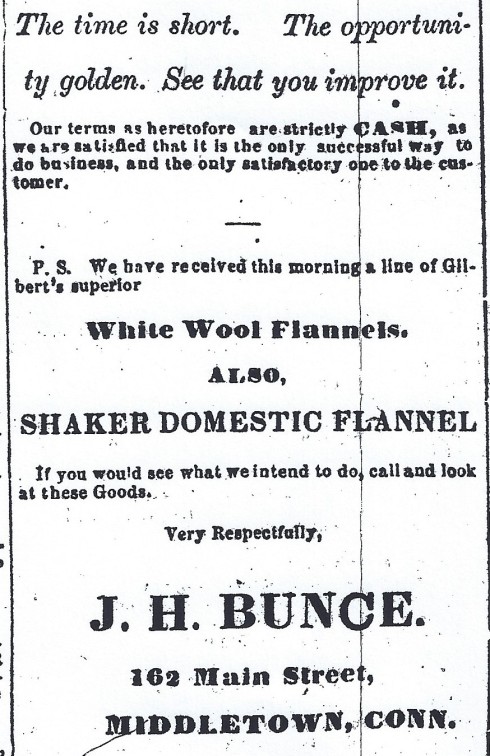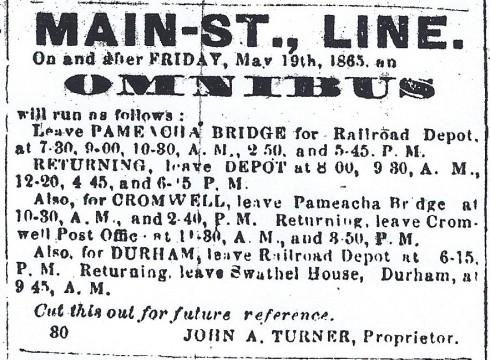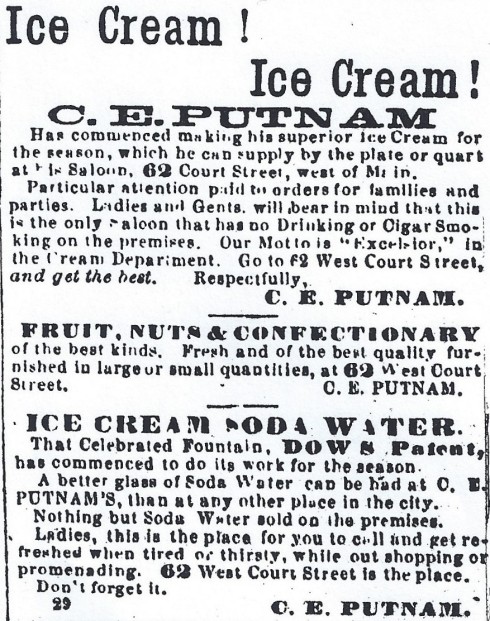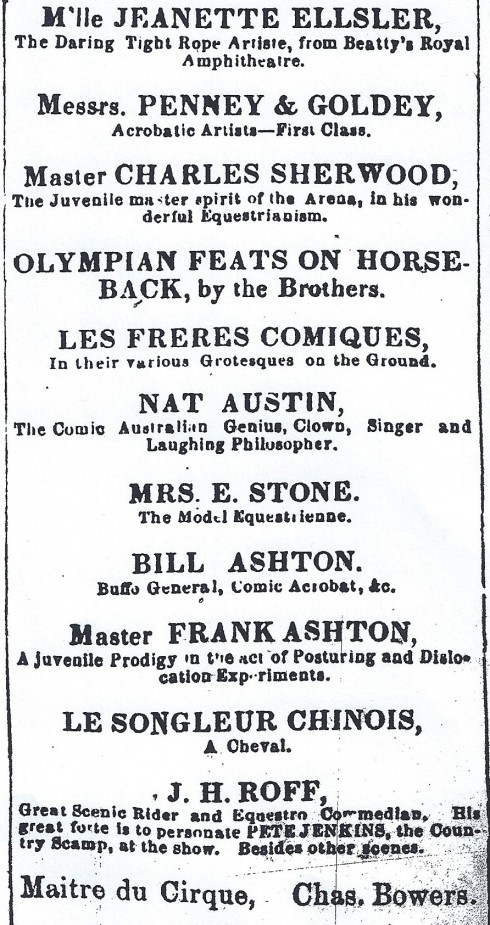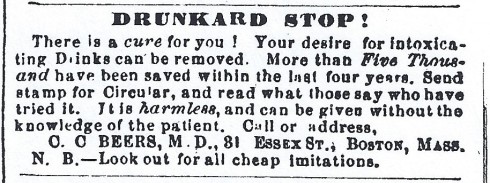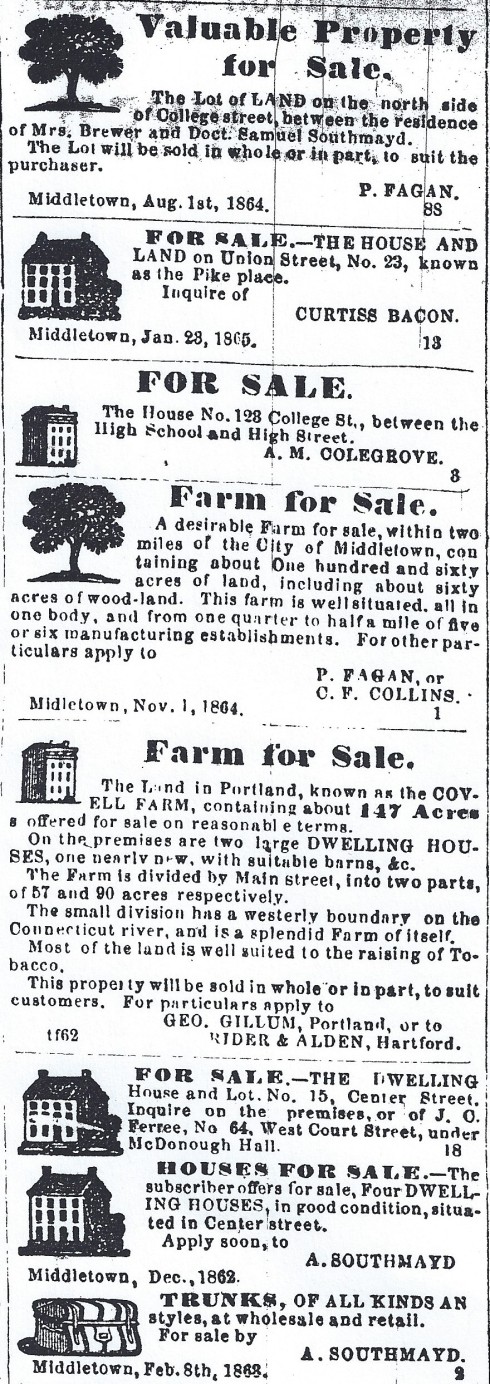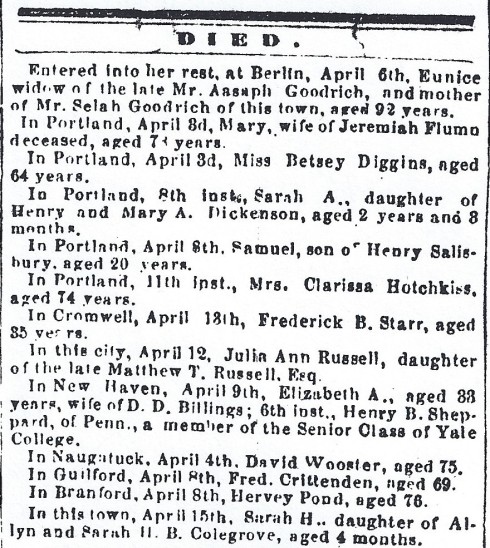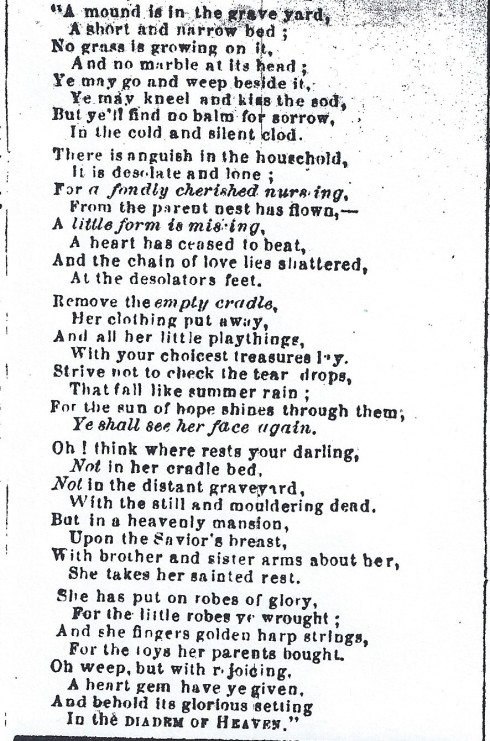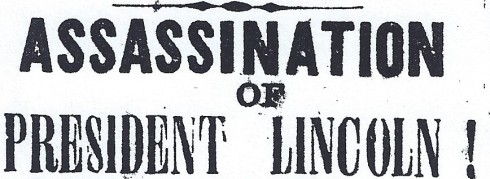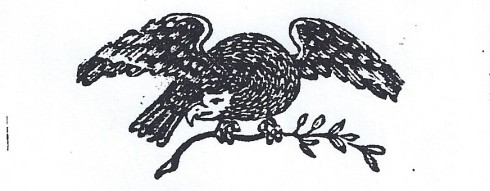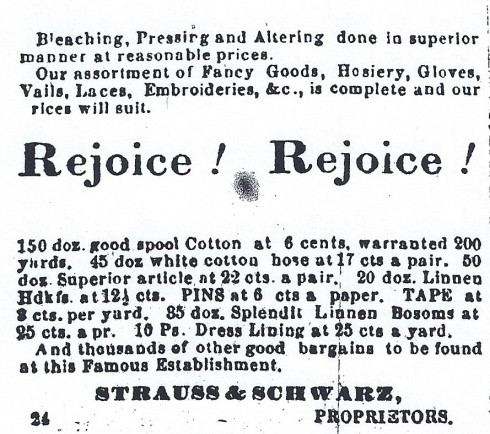From The Constitution, Wednesday, April 26, 1865 (volume 28, number 1426)
War News.
The rumors which have been circulating for some days about negotiations between Sherman and Johnston have at length taken definite shape. A courier from Gen. Sherman arrived at Washington last Friday, with the intelligence that that General had assumed the responsibility of arranging terms of peace with Gen. Johnston, and had agreed upon a temporary suspension of hostilities. At a Cabinet meeting held Friday night, the action of Gen. Sherman was disapproved by the President, by the Secretary of War, by Gen. Grant, and by every member of the Cabinet, and he was ordered to resume hostilities immediately. Lieut.-Gen. Grant left immediately, by a special steamer, to take supervision in person. A dispatch from Fortress Monroe announces his arrival at that place on Saturday. It is to be apprehended that these operations have given Jeff. Davis time to make good his escape, with the plunder of the Richmond banks.
Maj.-Gen. Canby reports that there were over 150 pieces of artillery found in the works around Mobile, with large quantities of ammunition and War supplies. The prisoners taken number about 1,000, and the cotton secured is about 3,000 bales.
All of Mosby’s gang have surrendered except himself; he has fled, and some of his late soldiers are in search of him, prompted by the offer, by Gen. Hancock, of $2,000 reward for the great guerrilla.
The Funeral Ceremonies on Wednesday.
From the information received from all parts of the country, it is safe to say nothing that has occurred since the organization of the government, has so moved the hearts of all the people, as the death of President Lincoln. The day fixed upon for the funeral ceremonies was universally observed, and in no part of the land with more apparent sincerity and unanimity than in Middletown—be it said to the honor of the heads and hearts of all our citizens. On Wednesday morning the whole city appeared in the habiliments of woe, and we are not of those who insist that any displayed, through fear of public sentiment, the outward symbols of sorrow which had not touched their hearts. It is one of those mighty afflictions in the presence of which prejudice, bigotry, partizan malignity and sectarian hate are awed into silence, and the soul, assuming its true dignity, is moved by those kindly sentiments and feelings which tell of the real nobility of human nature.
The day was one of the fairest that the season brings. At 10 a. m., the stores and other places throughout the city were closed; the church bells tolled from 11 to 12. One hundred minute guns were fired by the Douglas and Alsop Batteries commencing at 12 m. One of the largest meetings we have ever attended in this city, was held at the North Cong. Church, beginning at noon and lasting three hours. The house was crowded in every part, and hundreds went away unable even to get within sight of the exercises. The order of exercise was as follows:
Voluntary on Organ, and Singing.—Solo and Chorus, “Almighty Lord, before thy throne.”
Invocation and Reading of the Scriptures, Rev. Jeremiah Taylor.
Reading of Hymn—Rev. John Pegg.—“Why do ye mourn.”
Prayer—Rev. J. H. Gilbert.
Music—Solo and Quartette.—“Bow down thine ear.”
Address—Rev. Joseph Cummings, D. D.
Address—Rev. J. E. Bruce.
Music—Solo and Quartette.—“Rest, Spirit, rest.”
Address—Prof. F. H. Newhall.
Address—Rev. J. L. Dudley.
Hymn.—“God moves in a mysterious way.”
Benediction.
His Honor Mayor Warner, in opening the exercises, said:
The event which calls us together to-day is more momentous than any since the formation of our government, or any in the progress in the last decade of centuries. The personal embodiment of our nationality; of its power, sovereignty and dignity, the chief executive of the will of this people; the constitutional guardian of their rights, liberties and destinies; and as such the living symbol of constitutional form of governments, of human progress, of social and political equality; of civil and religious liberty, and of the high hopes of struggling humanity throughout the world, in the discharge and exercise of these sublime and almost divine functions and characteristics is struck down and at this hour lies straightened for the grave.
We have come to contemplate our dead President in the light, and through the gory shades of his tragic martyrdom,–we are gathered to contemplate those elements of his character which in their purity, simplicity and greatness have already silenced the voice of partizan malignity and hate; which has palsied the tongue of his defamers, and which have alike defied the scarcely less malignant and deadly touch of the assassin’s bullet; elements of character which defy any vicissitudes of time or eternity—which to-day can look Jehovah face to face and live, and which for all coming time, will command and receive the benediction of his countrymen and all future generations of men.
We are here under the shadows of a great affliction whilst the heart of the nation throbs its unutterable anguish at the tomb of its twice chosen chieftain; and apprehension, doubt and despondency seem to shut out and encurtain the future. Here, under the sanctions of our religion, around the altar and before the God of our fathers, we seem to see their martyrdoms walking in the gloom of their conflict; and they point to us the cheering, God-trusting motto which they inscribed upon the banners and which still beams upon us. We are here for invocation to that God to again place His bow of promise and peace in our political skies, and to indicate to this people the paths they can safely tread.
It is not my purpose to point out the moral of this calamity, and my poor common words would be mockery should I attempt to give utterance to the nation’s grief. But I cannot and will not forego the reflection,–almost a religious one—which steals over me and which seems also to have possessed the mind of our people, that the clotted shroud of this our dead, yet more than a living Cæsar, will be more powerful in impressing his virtues, his spotless example of political integrity upon the nation’s mind, more grand in its operations and effect in human events, more significant in the cause of liberty and justice, more weighty in the scale of human destiny, and more potent in moving the car of human progress, than he could have been had he moved in the sphere and accomplished the work which the partiality and choice of our people had assigned him to do.
Rev. Jeremiah Taylor, read numerous selections of Scripture. Mr. Pegg and Mr. Gilbert being absent, the hymn was read by Prof. Newhall and a lengthy and earnest prayer was offered by Rev. J. Taylor.
A Solo and Quartette was then given by a choir consisting of Miss Condon, Miss Ingham, Mrs. P. M. Wright, Mrs. Dr. Baker, Prof. Harrington, Messrs. J. N. Camp, Charles Stearns, and M. C. Elliott, under the direction of M. B. Copeland, Esq., who presided at the organ.
Rev. Dr. Cummings spoke with evident emotion. He referred in a touching manner to the sufferings of our soldiers in Southern prisons, and at the close of his remarks there were few dry eyes in all the vast audience. Dr. Cummings is always heard with pleasure by our citizens, but never have we seen his audience more interested than on this occasion.
Rev. Mr. Bruce spoke of the assassin, whose name, he said, is Slavery. He gave a number of facts and arguments to prove the correctness of the statement.
The address of Prof. Newhall was in every sense an excellent one. In closing he called upon all to swear by the Eternal God that no traitor shall press the soil or breathe the air of this land of Liberty—the home of Abraham Lincoln. The words were so well spoken and the sentiment was so acceptable that the audience, almost involuntarily loudly applauded.
Rev. Mr. Dudley said he had thought that the Rebellion had never done anything worthy of itself; and he had often wondered what dark and damnable thing would yet be disclosed. He wondered no longer—the deed was done. Then there was joy in Hell, and in some hearts not yet there. He spoke for nearly half an hour and the address was characterized by great earnestness and force,–at times by great beauty of thought and expression. The closing hymn was sung by the Choir and the benediction pronounced by Dr. Cummings.
The buildings throughout the city were with few exceptions, draped in mourning. Among which we will mention the Custom House and Post Office, which was heavily decorated, a full-length portrait of the late President being displayed in the porch; the Middletown and the First National Bank; the buildings of the fire companies with their flags at half mast; the store and windows of S. Stearns & Son, G. N. Ward, Wm. H. Ford, J. B. Southmayd, Chas. W. Hills, Foster & Vinal, H. C. Ransom, J. Bacon, N. V. Fagan, the rooms of the “Eurodelphians,” Bradley & Treadwell, Levy & Mooney, F. Brewer, J. S. Fairchild, J. Dessauer, H. D. Hall, Geo. Prior, J. D. Neale, E. Rockwell, Strauss & Schwartz, Benham and Boardman, H. Woodward, Miss Spaulding, E. Ackley, Mrs. Brooks, Misses Greenfield, F. D. Marvin, A. R. Parshley, Wm. Southmayd & Son, A. Kelsey, Adams Express and Telegraph offices. Among the residences were those of Mrs. J. K. F. Mansfield, Benj. Douglas, Dr. J. Ellis Blake, Mrs. Dyson, Miss Alsop, D. H. Chase, E. H. Roberts, Curtiss Bacon, Mrs. Woodward, Rev. M. Smith, J. W. Baldwin, D. Glover, Edwin Stearns, Wm. S. Camp, Misses Robertson, Mrs. Tobey, C. C. Hubbard, E. Loveland, H. Rutty, H. Boardman, S. G. Hurlburt, C. F. Collins, Beach, C. A. Boardman, N. Smith, J. S. Bailey, H. Cooley, J. W. Hayes, C. E. Putnam, H. Stancliff, A. Putnam, Miss M. Payne, A. Newton, J. G. Baldwin, Wm. J. Trench, J. W. Douglas, H. Ward, E. & F. Chaffee, M. Culver, C. C. Tyler, Mrs. Tompkins, Elijah Hubbard, D. J. Neale, J. Danforth, Mrs. M. Bradley, W. W. Wilcox, F. Comstock, Prof. Huber, E. Penfield, J. H. Sumner, Wm. Woodward, Dr. Gilman, H. G. Hubbard, J. H. Watkinson, A. B. Calef, G. M. Smith and B. C. Bacon. The flag of the Russell Manf’g Co., was trimmed in black and displayed at half mast. Several private dwellings in South Farms were appropriately draped including the store of Messrs. G. & J. Hubbard.
_________________________
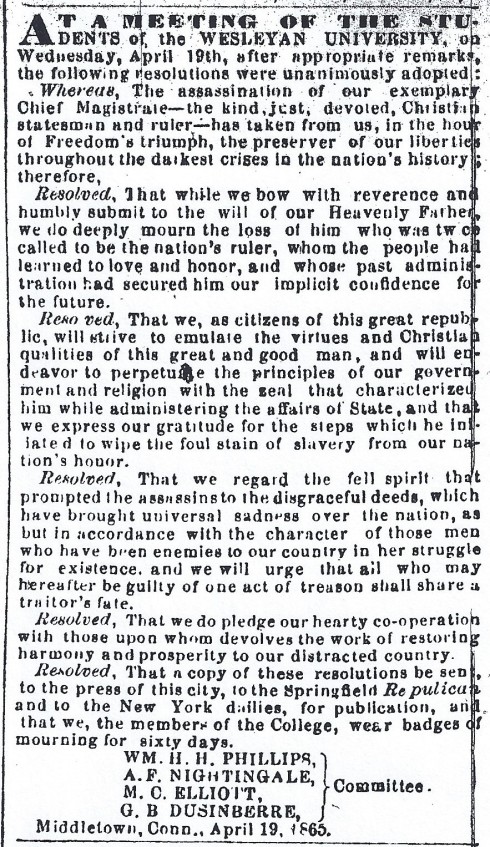
_________________________
The Granite State was crowded with passengers on Monday, anxious to attend the funeral ceremonies of the President in New York. The body arrived there Monday afternoon.
_________________________
Returned From the War.—George Loveland, eldest son of Elijah Loveland, Esq., of this city, returned to his home in this city last week, with an honorable discharge from three years service, in company A. 1st Conn. Heavy Artillery. He enlisted with Joseph Tobey, whose death we recorded a few months ago, a short time after the regiment had been in the field, and has remained faithful to his duty, without as much as a furlough, until his time of service expired. We acknowledge the receipt of a late Richmond paper.
_________________________
Gov. Buckingham has issued a proclamation, withdrawing the State bounty of $300 to volunteer, or any person who may be mustered in the service of the United States, after the 17th inst.
________________________
A. S. Hotchkiss, (formerly of this city,) local editor of the Courant, was elected last week, clerk of the Board of Common Council, in Hartford. Good for Albert.
_________________________
Editor of the Constitution:
Sir: I notice in your last paper that Samuel Birdsey, who once lived here, but now a traitor and rebel soldier, had returned (having lost his property south,) to receive and enjoy an ample property here, which his friend and agent had carefully managed for him, while engaged with his two substitutes in a warfare against the government. This fellow, after the battle of Bull Run, came here to look after his property, boasted of the masses of the south, sneeringly alluding to our defeat. Finding all safe, and leaving his property with his friend, he again started for his post in the confederate army, to assist in his cherished object of destroying the government. The war now being about closed, having done all he could to destroy our country, losing every penny south, returns to his native place to receive, from his faithful friend and agent, the property committed to his trust. The question seems to arrive, shall this rebel and avowed enemy be allowed to remain in this community, an eye-sore to every loyal soul, and living curse among us! Very tender and kind-hearted, indeed to their enemies, are the citizens of Middletown, if they allow it.
Union.
_________________________
Messrs. Newtons: I am sorry to trouble you again, and should not, had not the Sentinel man (!) repeated his falsehood respecting repairs on the Turnpike. His motto probably is, “That a lie well stuck to is as good as the Truth.” In answer to my last communication he says, “That he certainly saw them [that is the City repairers and teams] at work at the point named.”
Now this is a repetition of his barefaced, unmitigated falsehood! and he knows it to be such. If he wishes light on the subject let him go to the archives of the Town; he will find there a written contract between the Town of Middletown and the Turnpike Company, made soon after it was chartered, conditioned that the Town shall keep the Turnpike in repair from where the Catholic Church now stands to Sumner’s Creek, for the consideration of Twenty five dollars per annum, and that from that time to the present, the Turnpike Co., have yearly paid the amount into the Town Treasury. We repeat, that the city have never, since the contract was made, worked at the point where the sharp vision of the Sentinel blunderhead says he saw them. I do not propose to notice any more of his malicious slanders. If it is any enjoyment to him let him go on, it hurts no one.
C.
_________________________
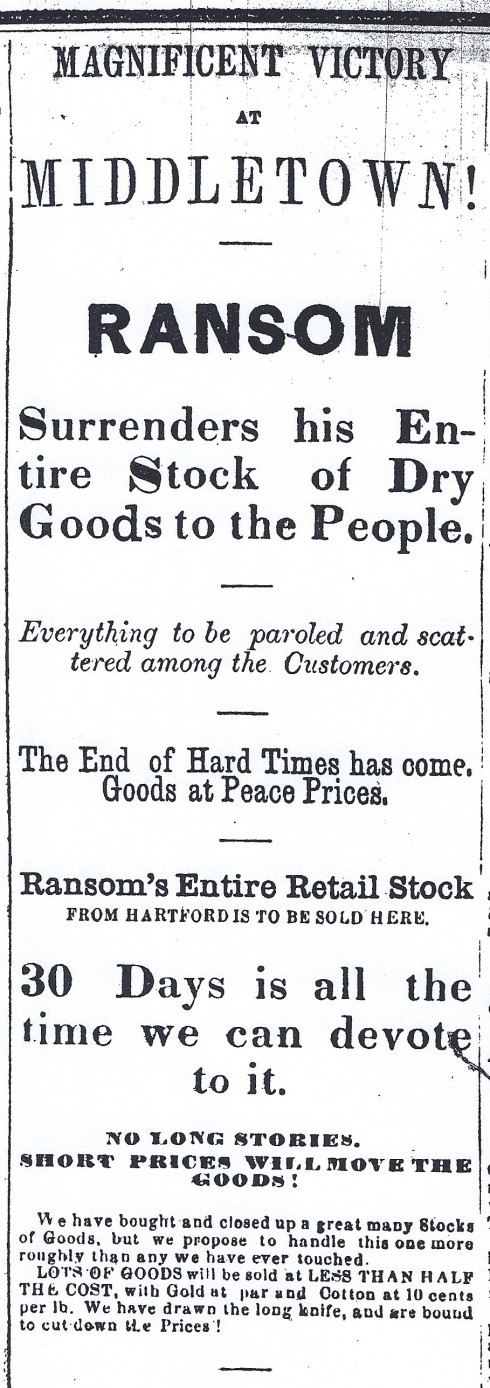
_________________________
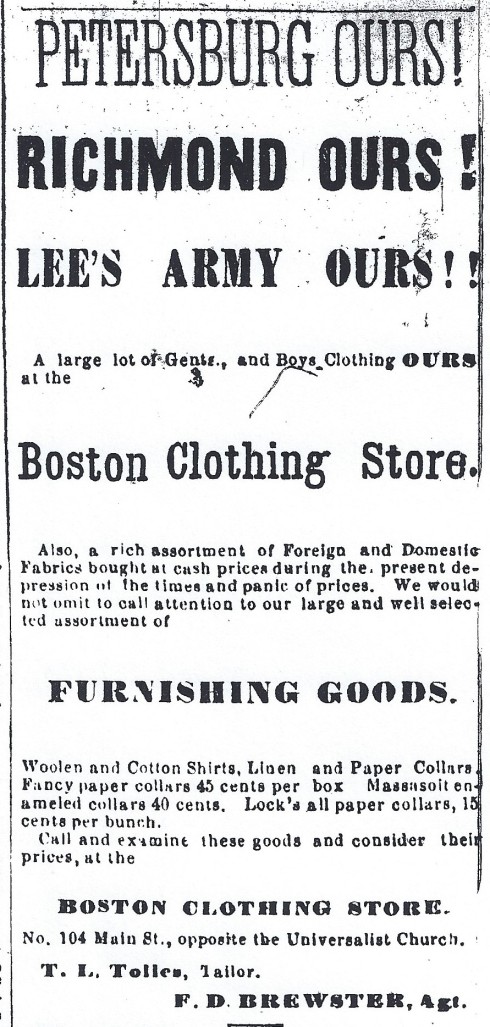
 The Constitution was a weekly newspaper in Middletown, Connecticut, published by Abner Newton. The paper was solidly Republican, although the city was largely Democratic.
The Constitution was a weekly newspaper in Middletown, Connecticut, published by Abner Newton. The paper was solidly Republican, although the city was largely Democratic.


